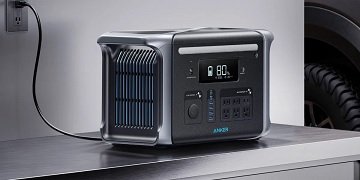During the period under development, power outage control can bring our daily life to a standstill. Whether it’s due to unusual weather, system problems, or other unforeseen circumstances, it’s important to have a tried-and-true control fortification system for your residence. In this comprehensive review and buying guide, we’ll explore the various power backup for home options to help you make an informed decision that ensures your home stays powered even during the most challenging times.
Why Do You Need a Power Backup for Your Home?
In today’s advanced world, control disappointments can result in information misfortune, disturbed communications, and compromised security systems. A power backup system ensures that your household functions smoothly, even during blackouts or load shedding. Whether it’s keeping the lights on, preserving perishable food, or staying connected, a power backup is your safety net. So, how do you choose the right one?
Types of Power Backup Systems
Standby Generators: Standby generators are a popular choice for homeowners seeking a seamless transition during power outages. These systems thus sanction when the foremost control supply is aggravated and can provide consistent imperativeness to the complete house. They run on a grouping of fills, such as ordinary gas, propane, or diesel, promoting versatility and extended runtime.
Portable Generators: Ideal for those on a budget or with limited space, portable generators are versatile and can be used both at home and for outdoor activities. While they require manual setup and fueling, they offer a quick solution for powering essential appliances and devices during emergencies.
Solar Power Backup: Harnessing the sun’s energy, solar power backup systems are eco-friendly and progressively popular. They consist of solar panels, battery storage, and inverters to convert sunlight into usable electricity. Although initial costs might be higher, they provide long-term savings and reduce reliance on fossil fuels.
Battery Backup Systems: Battery backup systems, often used in conjunction with solar panels, store excess energy generated during peak sunlight hours. They automatically kick in when the grid goes down, providing a reliable source of electricity for essential loads. These systems are silent, require minimal maintenance, and are expanding in popularity due to their efficiency.
Considerations Before Purchasing a Power Backup System
Power Requirements: Calculate the wattage of the appliances and devices you need to power during an outage. This will help determine the capacity of the backup system you require.
Fuel Source: Choose a system that aligns with your preferences and availability of fuel sources. Consider factors such as convenience, environmental impact, and fuel storage.
Installation and Maintenance: Evaluate the installation complexity and ongoing maintenance requirements. Standby generators often require professional installation, while portable generators and battery systems can be set up with relative ease.
Noise Level: For residential areas, noise can be a concern. Research the decibel levels of different backup systems to ensure they comply with local noise regulations.
Budget: Determine your budget and consider the long-term savings potential. While some systems have higher upfront costs, they may prove more cost-effective in the long run.
Environmental Impact of Different Systems:
Apart from the economic aspects, it’s crucial to consider the environmental footprint of your power backup choice. While generators powered by fossil fuels emit pollutants, solar power systems harness clean and renewable energy. By reducing your reliance on non-renewable resources, you contribute to a sustainable future.
Conclusion
Investing in a power backup for home system is an investment in uninterrupted comfort, safety, and convenience. With various options available, each catering to different needs and budgets, you can find the perfect solution that aligns with your requirements. By considering factors like power requirements, fuel sources, installation, and maintenance, you can confidently select a power backup system that ensures your home remains resilient in the face of unexpected power outages. Take charge of your home’s energy future today!
